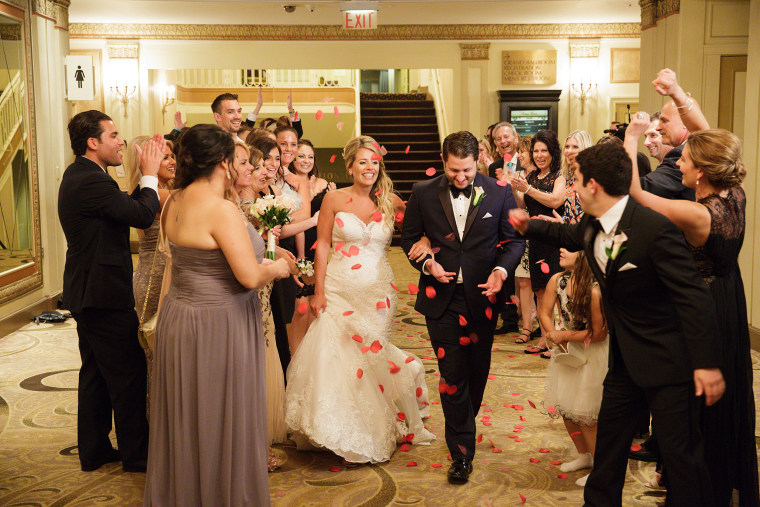For all of its pitfalls, one positive thing reality TV has done for the masses is to open audiences up to the very different ways people live their lives — what it’s like to be a housewife in the one percent, a follower of a religion that condones polygamy, living life as a “little person” and even marrying a stranger.
"Married at First Sight," which just wrapped up its fifth season, is very much what you'd expect from the show's title. Six singles who haven’t had luck finding a life partner on their own put their romantic fate in the hands of a team of experts. The experts evaluate each potential couple's compatibility across sexuality, spirituality and psychology, coaching them both before they make their way to the altar and in the weeks that follow the marriage to help them navigate married life with their new spouse.
And they seemed to do an outstanding job: Every single couple decided to stay married on the season finale.
According to Dr. Joseph Cilona, PsyD, who served as the show's psychologist for three seasons, the research and consideration that goes into matching each couple is extremely thorough.
"During my [time] working as the psychologist on the team of expert matchmakers for 'Married at First Sight,' I performed an intense battery of psychological tests on all the participants to recommend matches," he explains. "My research yielded nearly 100 pages of data on each participant, and I interpreted and analyzed that data for close to 400 hours to examine potential compatibilities and complementarities of personality traits. I also conducted in-depth clinical interviews and formulated an extensive and detailed questionnaire that covered topics like personal values, family history, romantic relationship history, career and work life, lifestyle habits and preferences and many other topics."
The divorce rate of arranged marriages is less than 4 percent versus 40 percent of marriages in the U.S. where partners chose who to marry on their own free will.
Arranged marriages are far from a new concept, and they’re still practiced in certain parts of the world. "India, Pakistan, Japan and China have the highest percentages of arranged marriages," says Dr. Cilona. "For example, in India, it is speculated that as much as 60 percent of marriages are arranged." And while research on the success rates of arranged couples is thin, one study done in 2012 shows the divorce rate of arranged marriages being less than 4 percent — as opposed to around 40 percent of marriages in the U.S. where partners chose who to marry on their own free will. In fact, in the show’s five seasons, two couples remain married – one of which is expecting their first baby this year. Which by reality show standards is impressive (we're looking at you, "Bachelor").
The majority of us won’t end up at the altar facing a complete stranger, but there is something to be said for the way that those tasked with selecting suitable mates for others evaluate compatibility. Are there some guiding principles that we can borrow from them on our own quest to find love? Here’s a look at the process behind arranged marriages, and what we can learn from the tradition that will help set us up for romantic success.
Marrying a Stranger: What You Do Know Before the Big Day
Unlike "Married at First Sight" where the soon-to-be husband and wife know nothing about their future spouse (not even their name), there's typically a fair amount of information exchanged during arranged marriages.
"The method, process and execution of arranged marriages around the world can vary quite dramatically depending on things like religious beliefs, social customs and societal, as well as individual norms," says Cilona. "Elder family members often play a primary or pivotal role in many countries that practice arranged marriage. In some cultures like Japan, arranged marriages are often facilitated by matchmakers that play an important role in things like initiating matches of individuals for marriage, and acting as a liaison for communication between individuals and families throughout the process."
Dr. Anjhula Mya Singh Bais, PhD, says questions regarding how much each person earns, whether they've been divorced before and even providing bank statements that back up the assets and property each party is claiming isn't abnormal during the arranged marriage process. "There are usually opportunities to craft your own questions because it is still an idiosyncratic process tailored to each person," she says. "For example, which type of weather you like, your favorite type of music, etc. But it's important to note that arranged marriages are based on the premise that elders know better. Caste, class, ethnicity, race and religion are important, so much so that they have to be the same in order to ensure future success and viability."
It’s important to remember that there are often many variables that influence compatibility in love and marriage, and that feelings are just a part of a much larger picture.
Arranged marriages can take on a more modern iteration, which was the case for Slisha Kankariya, 28, an entrepreneur based in New York City, who was arranged by her aunt four years ago. Kankariya had the opportunity to "date" the partner she was arranged with before committing — albeit on an escalated timeline. "We were able to meet about five times on our own for lunches and dinners and walks through the city and Central Park," she says. "And through that time and phone conversations, we were able to ask each other questions. Some areas like past mistakes and insecurities were difficult to broach, but they are important to cover. Since timelines are more condensed and more people are involved in the process (with their hopes pegged on a possible match) it is even more important to be honest with each question and answer."

What Traditional Daters Can Learn From Arranged Marriages
When examining what we can glean from the process of arranged marriages, Dr. Bais says it's important to note that whether you're seeking marriage by way of your own personal choice or an arrangement, each comes with its advantages and setbacks. "It's pertinent to remember that you are exchanging one set of complications for another," she explains. "If you approach arranged marriage, then you concede to looking at marriage as a business, financial and pragmatic solution. The love and romance, the ineffable feeling that have inspired countless poets across the ages is missing, at least in the beginning. Those who have an arranged marriage often tell me that they have a practical old fashioned marriage that is likened to a to-do list, but the connection is missing. The soul connect, however, is what often leads to tumultuous passion and expensive messy roller coaster relationships and divorces."
So, how can we strike a happy medium between practicality and passion?
The biggest takeaway, whether in arranged or love situations, is to foster authenticity and gauging that astutely in others.
"Those seeking the best aspects of arranged marriages on their own would do well to push the transparency and compatibility aspects," says Dr. Bais. "There are positives in knowing a partner's net worth and not subsuming their personal debt. Having said that, there are umpteen amounts of cases where the situation of arranged marriages and the cultural context forces people to lie about their past and future because they know they are being judged in a harsher light than if you were sitting opposite each other on a private first date for the purposes of exploration rather than marriage. Without fail, the majority of arranged set up marriages I have seen as clients, and also personally, have lied about crucial aspects such as health history, sexual history and financial assets. The biggest takeaway, whether in arranged or love situations is to foster authenticity and gauging that astutely in others."
Dr. Cilona also agrees that there's something to be said for not relying solely on the romantic feelings you have toward a potential partner in order to make smarter choices in love. "When it comes to dating, many people use their emotions as a compass for navigating love and romance, and emotions often play the primary role in decision making and behavior," he explains. "For those that want to make better decisions when it comes to dating and romance, it’s important to remember that there are often many, many variables that influence compatibility and complementarity in love and marriage, and that feelings are just a part of a much larger picture."
Kankariya attributes evaluating shared values as an important part of the equation for a successful arranged marriage. "What I've learned through arranged marriage is that people tend to change quite a bit even over the course of a few years, especially if you get engaged while you're young (I was 23, he was 24.)," she says. "The most important things to assess are the person's values, integrity and traits like their willingness to work hard, how much they care about family etc. If these core values match up, the rest of life is a puzzle piece that you put together as a couple."
If core values match up, the rest of life is a puzzle piece that you put together as a couple.
What Makes a Marriage Last?
Both in traditional arranged marriages and in the reality show version, the level of commitment exhibited by each partner is heightened from what we see in traditional marriages. This season in particular, participants constantly reiterate the importance they place on marriage, and their deep desire to be a part of one. "The biggest lesson I learned from my experience as a matchmaker of arranged marriages on Married at First Sight and the extensive study and research into what makes arranged marriages work can be summed up in one word: Commitment," says Dr. Cilona. "I believe that the success of many arranged marriages comes down to each individual prioritizing commitment to the marriage and relationship itself above all else. This often means that commitment to working through issues is often put before personal needs and feelings. Commitment to making the marriage work is always the top priority, and seems to be the primary reason for the success of arranged marriages. Success is defined not only as longevity and not ending in divorce, but also marriages that are fulfilling and satisfying to each partner."

